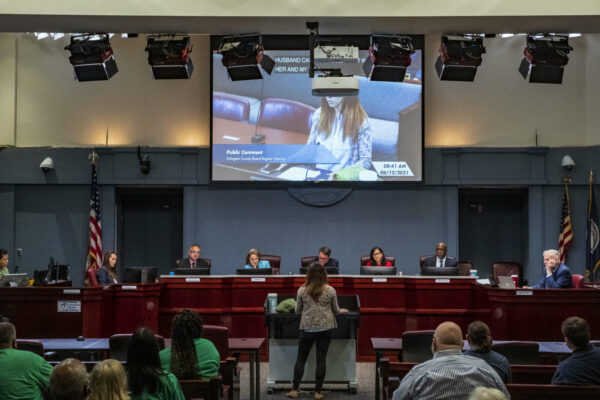Arlington County could use federal American Rescue Plan Act funding to take a swing at making the “Arlington Way” work for more residents.
From what a development project should look like to where protected bike lanes could go, Arlington often invites residents to have a say in policy-making, a local community engagement philosophy known as the “Arlington Way.”
Although it’s a point of pride for the county, officials and staff have acknowledged that these pathways privilege those with the time, resources and connections to invest in discussions about projects, studies and policies — typically older, more affluent residents.
Left out of important county conversations, then, is Arlington’s growing population of renters, parents of young kids, people who work non-traditional hours, people without access to reliable and affordable transportation, and those who are not fluent English speakers.
This is not just a topic Arlington is grappling with. Over in Richmond, the city gave out small stipends to people who participated in updating its citywide master plan. And nationally, compensation has emerged as a “best practice” to “ensure lived experience and community expertise are fairly compensated and publicly recognized,” according to the Urban Institute.
So now, the county is proposing to allocate $50,000 during this fiscal year for a pilot program exploring different ways to make it easier for underrepresented community members to participate in engagement processes through compensation. It would apply to one-time meetings for issues as they arise as well as the longer-term time commitment of an ongoing advisory commission.
“Improving engagement with, and representation in civic structures by, historically underserved communities is a key priority nationally and for Arlington County,” according to a county ARPA spending plan. “Recent Dialogues on Race and Equity surfaced community perspectives that Arlington’s structures for decisions and public input are narrow, advantage dominant perspectives and do not offer access or representation for communities of color to County government leadership.”
Compensation could look like gift cards, childcare and meals, or waived transportation costs. As part of the pilot, the county will collect data on whether these practices increase the diversity of those who participate in government processes.
Championing this cause is Board Vice-Chair Katie Cristol, who told ARLnow earlier this month that there would soon be news about how the county aims to tackle the “Arlington Way.”
“From my perspective, this $50k in ARPA funding is important because it will help catalyze complicated, government-wide conversations about how to reduce barriers for underrepresented Arlingtonians to participate in public processes,” she said. “One of our most challenging issues is the question of how to value time spent, and address obstacles to participation, in our standing advisory bodies.”
She commended the county’s Communications and Public Engagement team for doing “some very exciting work engaging residents in more ad-hoc opportunities,” such as when the county went out to the Lubber Run Community Center to ask kids to sketch out what they’d like to see from a recreation facility.
“But we also do still derive a lot of value from groups, like Commissions, that advise the County over time and can serve as ‘laboratories’ for new ideas; and it’s clearly a lot harder to engage in that kind of ongoing commitment if childcare, transportation, opportunity costs of shift work, etc. are obstacles for you,” she said.
Previously, she said, this has been tested out in Arlington with private funding. When Arlington Partnership for Affordable Housing hosted planning meetings about the future of Columbia Pike, it organized multi-lingual sessions with dinner and childcare provided with funding from an outside grant, she said.
Eventually, the county aims to turn the results of the pilot into “common policies that can be implemented across County departments and projects,” according to the funding plan.
When asked who will oversee the pilot program and when it could be rolled out, as well as who would monitor the money to ensure it gets to the right people and so that it isn’t used to engineer who participates, a county spokeswoman said answers will come when the pilot program kicks off.
“That will all be developed in an implementation plan if/when approved by the county board,” she said.
County Board members are expected to vote on the allocation plan when they meet in November.


